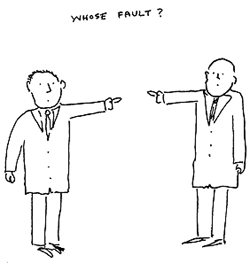 That is what the Malaysian government is doing apparently. Malaysia's Information Minister has warned newspapers (and by extension citizens) against using blogs as sources of information. According to the Star newspaper, Minister Zainuddin Maidin described blogs as "anarchist websites" and said most websites are run by frustrated journalists and political pundits.
That is what the Malaysian government is doing apparently. Malaysia's Information Minister has warned newspapers (and by extension citizens) against using blogs as sources of information. According to the Star newspaper, Minister Zainuddin Maidin described blogs as "anarchist websites" and said most websites are run by frustrated journalists and political pundits.Governments, companies and politicians worldwide are having difficulty adjusting to our wired world. The Internet disintermediates government and others who have traditionally filtered or rationed information. News oligopolies have ended.
Today, individuals can easily and instantaneously project their ideas, opinions and reporting out to the world. It can be a painful experience, as the Malaysian government discovered when allegations of corruption appeared in blogs and were later picked up by mainstream media.
Instant, unfiltered access to information is good. Yet, people still have a responsibility to assess (and question) the credibility of sources -- whether they are blogs or government-controlled media.
It's hard to lose control, and easy to scapegoat bloggers, as I noted here in connection with a company targeting a widely read blog.
As with most things, however, the fault lies not in our blogs but in ourselves.
Categories: Malaysia, blogging







1 comment:
Thanks for your thoughts.
Unfortunately, their unaffiliated nature can also make them easy targets for people looking to lay blame.
It is amazing how much expertise is out there and now, via Internet, right at our fingertips.
Post a Comment